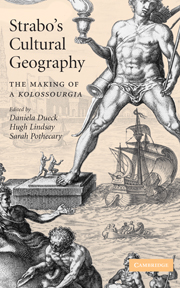Book contents
- Frontmatter
- Contents
- List of maps
- List of illustrations
- List of tables
- List of figures
- List of contributors
- Acknowledgements
- List of abbreviations
- Introduction
- 1 Kolossourgia. ‘A colossal statue of a work’
- 2 Reflections of philosophy: Strabo and geographical sources
- 3 Who is a barbarian? The barbarians in the ethnological and cultural taxonomies of Strabo
- 4 Gender at the crossroads of empire: locating women in Strabo's Geography
- 5 Strabo and Homer: a chapter in cultural history
- 6 Strabo's use of poetry
- 7 Strabo's sources in the light of a tale
- 8 The foundation of Greek colonies and their main features in Strabo: a portrayal lacking homogeneity?
- 9 Ανδρες ἔνδοξοι or ‘men of high reputation’ in Strabo's Geography
- 10 Comparing Strabo with Pausanias: Greece in context vs. Greece in depth
- 11 The European provinces: Strabo as evidence
- 12 Amasya and Strabo's patria in Pontus
- 13 Cappadocia through Strabo's eyes
- 14 Greek geography and Roman empire: the transformation of tradition in Strabo's Euxine
- 15 Josephus' hidden dialogue with Strabo
- 16 Temporal layers within Strabo's description of Coele Syria, Phoenicia and Judaea
- Bibliography
- Index of geographical names
- Index of personal names
7 - Strabo's sources in the light of a tale
Published online by Cambridge University Press: 18 December 2009
- Frontmatter
- Contents
- List of maps
- List of illustrations
- List of tables
- List of figures
- List of contributors
- Acknowledgements
- List of abbreviations
- Introduction
- 1 Kolossourgia. ‘A colossal statue of a work’
- 2 Reflections of philosophy: Strabo and geographical sources
- 3 Who is a barbarian? The barbarians in the ethnological and cultural taxonomies of Strabo
- 4 Gender at the crossroads of empire: locating women in Strabo's Geography
- 5 Strabo and Homer: a chapter in cultural history
- 6 Strabo's use of poetry
- 7 Strabo's sources in the light of a tale
- 8 The foundation of Greek colonies and their main features in Strabo: a portrayal lacking homogeneity?
- 9 Ανδρες ἔνδοξοι or ‘men of high reputation’ in Strabo's Geography
- 10 Comparing Strabo with Pausanias: Greece in context vs. Greece in depth
- 11 The European provinces: Strabo as evidence
- 12 Amasya and Strabo's patria in Pontus
- 13 Cappadocia through Strabo's eyes
- 14 Greek geography and Roman empire: the transformation of tradition in Strabo's Euxine
- 15 Josephus' hidden dialogue with Strabo
- 16 Temporal layers within Strabo's description of Coele Syria, Phoenicia and Judaea
- Bibliography
- Index of geographical names
- Index of personal names
Summary
After the last Ptolemaic dynastic conflicts, the interventions of Caesar and Antony and the addition of Egypt to the Roman world, there was a period of stability and peace. This provided an appropriate political and social situation for established scholars, native or foreign, to work in the famous library of Alexandria. Even though it was now not the only centre of knowledge, it continued to excite the admiration of visitors, and retained the prestige of its Hellenistic past, as well as a paramount role in intellectual activities. Invited by his friend, the prefect of Egypt Aelius Gallus, Strabo had many good reasons to stay there, search the library for rare books and get pieces of information which could be difficult to find elsewhere. It is Strabo's track to information which I presently intend to examine through one case-study. Our task is first to compare variant accounts of the story under consideration and second, to analyse their origin. The purpose of this paper goes a little further, as it also touches on the issue of the place and the time of the compilation of the Geography, particularly of the seventeenth book on Egypt and Libya.
In the seventeenth book of his Geography Strabo tells the story of a courtesan in Egypt called Rhodopis or Doricha. Various tales were told of this courtesan by authors both before and after Strabo.
- Type
- Chapter
- Information
- Strabo's Cultural GeographyThe Making of a Kolossourgia, pp. 108 - 117Publisher: Cambridge University PressPrint publication year: 2005



